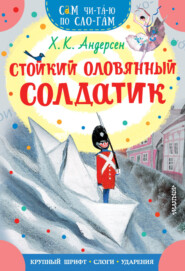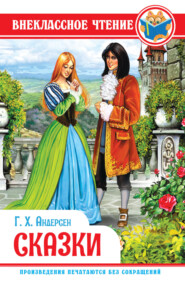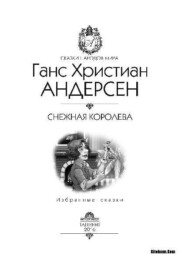По всем вопросам обращайтесь на: info@litportal.ru
(©) 2003-2024.
✖
Wonderful Stories for Children
Настройки чтения
Размер шрифта
Высота строк
Поля
"I see it and hear it," thought the daisy; "the sun shines upon me, and the winds kiss me! O, what a many gifts I enjoy!"
Inside the garden paling there were such a great many stiff, grand flowers; and all the less fragrance they had the more they seemed to swell themselves out. The pionies blew themselves out that they might be bigger than the roses; but it is not size which does every thing. The tulips had the most splendid colors, and they knew it too, and held themselves so upright on purpose that people should see them all the better. They never paid the least attention to the little daisy outside, but it looked at them all the more, and thought, "How rich they are, and how beautiful! Yes, to be sure, the charming bird up there must fly down and pay them a visit. Thank God! that I am so near that I can see all the glory!" And while she was thinking these thoughts – "Quirrevit!" down came the lark flying, – but not down to the pionies and the tulips: no! but down into the grass to the poor little daisy; which was so astonished by pure joy, that it did not know what it should think.
The little bird danced round about, and sang, "Nay, but the grass is in flower! and see, what a sweet little blossom, with a golden heart and a silver jerkin on!" – for the yellow middle of the daisy looked as if it were of gold, and the little leaves round about were shining and silver white.
So happy as the little daisy was it is quite impossible to describe! The bird kissed it with its beak, sang before it, and then flew up again into the blue air. It required a whole quarter of an hour before the daisy could come to itself again. Half bashfully, and yet with inward delight, it looked into the garden to the other flowers; they had actually seen the honor and the felicity which she had enjoyed; they could certainly understand, she thought, what a happiness it was. But the tulips stood yet just as stiffly as before, and their faces were so peaked and so red! – for they were quite vexed. The pionies were quite thick-headed, too! it was a good thing that they could not talk, or else the daisy would have been regularly scolded. The poor little flower, however, could see very plainly that they were not in a good humor, and that really distressed her. At that very moment there came a girl into the garden with a great knife in her hand, which was very sharp and shining, and she went all among the tulips, and she cut off first one and then another.
"Ah!" sighed the little daisy, "that was very horrible; now all is over with them!"
So the girl went away with the tulips. The daisy was glad that it grew in the grass, and was a little mean flower; it felt full of gratitude, and when the sun set, it folded its leaves, slept, and dreamed the whole night long about the sun and the little bird.
Next morning, the flower again, full of joy, spread out all its white leaves, like small arms, towards the air and the light; it recognised the bird's voice; but the song of the bird was very sorrowful. Yes, the poor little bird had good reason for being sad! it had been taken prisoner, and now sat in a cage close by the open window of the pleasure-house. It sang about flying wherever it would in freedom and bliss; it sang about the young green corn in the fields, and about the charming journeys which it used to make up in the blue air upon its hovering wings. The poor bird was heavy at heart, and was captive in a cage.
The little daisy wished so sincerely that it could be of any service; but it was difficult to tell how. In sympathizing with the lark, the daisy quite forgot how beautiful was every thing around it – how warmly the sun shone, and how beautifully white were its own flower-leaves. Ah! it could think of nothing but of the captive bird, for which it was not able to do any thing.
Just then came two little boys out of the garden; one of them had a knife in his hand, large and sharp, like that which the girl had, and with which she cut off the tulips. They went straight up to the little daisy, which could not think what they wanted.
"Here we can get a beautiful grass turf for the lark," said one of the boys; and began deeply to cut out a square around the daisy-root, so that it was just in the middle of the turf.
"Break off the flower!" said the other boy; and the daisy trembled for very fear of being broken off, and thus losing its life; when it would so gladly live and go with the turf into the cage of the captive lark.
"Nay, let it be where it is!" said the other boy; "it makes it look so pretty!"
And so it was left there, and was taken into the cage to the lark.
But the poor bird made loud lamentations over its lost freedom, and struck the wires of the cage with its wings. The little daisy could not speak, could not say one consoling word, however gladly it would have done so. Thus passed the forenoon.
"There is no water here," said the captive lark; "they are all gone out, and have forgotten to give me a drop to drink! my throat is dry and burning! it is fire and ice within me, and the air is so heavy! Ah! I shall die away from the warm sunshine, from the fresh green leaves, from all the glorious things which God has created!" and with that it bored its little beak down into the cool turf to refresh itself a little. At that moment it caught sight of the daisy, nodded to it, kissed it with its beak, and said, "Thou also must wither here, thou poor little flower! Thou and the little plot of grass, which they have given me for the whole world which I had out there! Every little blade of grass may be to me a green tree, every one of thy little white leaves a fragrant flower! Ah! you only tell me how much I have lost!"
"Ah! who can comfort him!" thought the daisy, but could not move a leaf; and yet the fragrance which was given forth from its delicate petals was much sweeter than is usual in such flowers. The bird remarked this, and when, overcome by the agony of thirst and misery, it tore up every green blade of grass, it touched not the little flower.
Evening came, and yet no one brought a single drop of water to the poor bird. It stretched out its beautiful wings, fluttered them convulsively, and its song was a melancholy wailing; its little head bowed down towards the flower, and its heart broke from thirst and longing. The little flower knew this not; before the evening was ended, it had folded its petals together and slept upon the earth, overcome with sickness and sorrow.
Not until the next morning came the boys, and when they saw that the bird was dead they wept, wept many tears, and dug for it a handsome grave, which they adorned with leaves of flowers. The corpse of the bird was laid in a beautiful red box. It was to be buried royally, the poor bird! which, when full of life and singing its glorious song, they forgot, and let it pine in a cage, and suffer thirst – and now they did him honor, and shed many tears over him!
But the sod of grass with the daisy, that they threw out into the dust of the highway; no one thought about it, though it had felt more than any of them for the little bird, and would so gladly have comforted it.
THE NAUGHTY BOY
There was once upon a time an old poet, such a really good old poet! One evening, he sat at home – it was dreadful weather out of doors – the rain poured down; but the old poet sat so comfortably, and in such a good humor, beside his stove, where the fire was burning brightly, and his apples were merrily roasting.
"There will not be a dry thread on the poor souls who are out in this weather!" said he; for he was such a good old poet.
"O let me in! I am freezing, and I am so wet!" cried the voice of a little child outside. It cried and knocked at the door, while the rain kept pouring down, and the wind rattled at all the windows.
"Poor little soul!" said the old poet, and got up to open the door. There stood a little boy; he had not any clothes on, and the rain ran off from his long yellow hair. He shook with the cold; if he had not been taken in, he would most surely have died of that bad weather.
"Thou poor little soul!" said the kind old poet, and took him by the hand; "come in, and I will warm thee! and thou shalt have some wine, and a nice roasted apple, for thou art a pretty little boy!"
And so he was. His eyes were like two bright stars, and, although the water ran down from his yellow hair, yet it curled so beautifully. He looked just like a little angel; but he was pale with the cold, and his little body trembled all over. In his hand he carried a pretty little bow; but it was quite spoiled with the rain, and all the colors of his beautiful little arrows ran one into another with the wet.
The good old poet seated himself by the stove, and took the little boy upon his knee; he wrung the rain out of his hair, warmed his little hands in his, and made some sweet wine warm for him; by this means the rosy color came back into his cheeks, he jumped down upon the floor, and danced round and round the old poet.
"Thou art a merry lad," said the poet; "what is thy name?"
"They call me Love," replied the boy; "dost thou not know me? There lies my bow; I shoot with it, thou mayst believe! See, now, the weather clears up; the moon shines!"
"But thy bow is spoiled," said the old poet.
"That would be sad!" said the little boy, and took it up to see if it were. "Oh, it is quite dry," said he; "it is not hurt at all! The string is quite firm: now I will try it!"
And with that he strung it, laid an arrow upon it, took his aim, and shot the good old poet right through the heart!
"Thou canst now see that my bow is not spoiled!" said he; and laughing as loud as he could, ran away. What a naughty boy! to shoot the good old poet who had taken him into the warm room; who had been so kind to him, and given him nice wine to drink, and the very best of his roasted apples!
The poor poet lay upon the floor and wept, for he was actually shot through the heart, and he said, "Fy! what a naughty boy that Love is! I will tell all good little children about him, that they may drive him away before he makes them some bad return!"
All good children, boys and girls, to whom he told this, drove away that naughty little lad; but for all that he has made fools of them all, for he is so artful! When students go from their lectures, he walks by their side with a book under his arm, and they fancy that he too is a student, and so he runs an arrow into their breasts. When young girls go to church, and when they stand in the aisle of the church, he too has followed them. Yes, he is always following people!
He sits in the great chandelier in the theatre, and burns with a bright flame, and so people think he is a lamp, but afterwards they find something else! He runs about the king's garden, and on the bowling-green! Yes! he once shot thy father and mother through the heart! Ask them about it, and then thou wilt hear what they say. Yes, indeed, he is a bad boy, that Love; do thou never have any thing to do with him! – he is always running after people! Only think! once upon a time, he even shot an arrow at thy good old grandmother! – but that is a long time ago, and it is past. But thus it is, he never forgets anybody!
Fy, for shame, naughty Love! But now thou knowest him, and knowest what a bad boy he is!
TOMMELISE
Once upon a time, a beggar woman went to the house of a poor peasant, and asked for something to eat. The peasant's wife gave her some bread and milk. When she had eaten it, she took a barley-corn out of her pocket, and said – "This will I give thee; set it in a flower-pot, and see what will come out of it."
The woman set the barley-corn in an old flower-pot, and the next day the most beautiful plant had shot up, which looked just like a tulip, but the leaves were shut close together, as if it still were in bud.
"What a pretty flower it is!" said the woman, and kissed the small red and yellow leaves; and just as she had kissed them, the flower gave a great crack, and opened itself. It was a real tulip, only one could see that in the middle of the flower there sat upon the pintail a little tiny girl, so delicate and lovely, and not half so big as my thumb, and, therefore, woman called her Tommelise.
A pretty polished walnut-shell was her cradle, blue violet leaves were her mattress, and a rose leaf was her coverlet; here she slept at night, but in the day she played upon the table, where the woman had set a plate, around which she placed quite a garland of flowers, the stalks of which were put in water. A large tulip-leaf floated on the water. Tommelise seated herself on this, and sailed from one end of the plate to the other; she had two white horse-hairs to row her little boat with. It looked quite lovely; and then she sang – Oh! so beautifully, as nobody ever had heard!
One night, as she lay in her nice little bed, there came a fat, yellow frog hopping in at the window, in which there was a broken pane. The frog was very large and heavy, but it hopped easily on the table where Tommelise lay and slept under the red rose leaf.
"This would be a beautiful wife for my son!" said the frog; and so she took up the walnut-shell in which Tommelise lay, and hopped away with it, through the broken pane, down into the garden.
Here there ran a large, broad river; but just at its banks it was marshy and muddy: the frog lived here, with her son. Uh! he also was all spotted with green and yellow, and was very like his mother. "Koax, koax, brekke-ke-kex!" that was all that he could say when he saw the pretty little maiden in the walnut-shell.
"Don't make such a noise, or else you will waken her," said the old frog; "and if you frighten her, she may run away from us, for she is as light as swan's down! We will take her out on the river, and set her on a waterlily leaf; to her who is so light, it will be like an island; she cannot get away from us there, and we will then go and get ready the house in the mud, where you two shall live together."
There grew a great many waterlilies in the river, with their broad green leaves, which seemed to float upon the water. The old frog swam to the leaf which was the farthest out in the river, and which was the largest also, and there she set the walnut-shell, with little Tommelise.
The poor little tiny thing awoke quite early in the morning, and when she saw where she was she began to cry bitterly, for there was water on every side of the large green leaf, and she could not get to land.
The old frog sat down in the mud, and decked her house with sedge and yellow water-reeds, that it might be regularly beautiful when her new daughter-in-law came. After this was done, she and her fat son swam away to the lily leaf, where Tommelise stood, that they might fetch her pretty little bed, and so have every thing ready before she herself came to the house.
The old frog courtesied to her in the water, and said, – "Allow me to introduce my son to you, who is to be your husband, and you shall live together, so charmingly, down in the mud!"

















